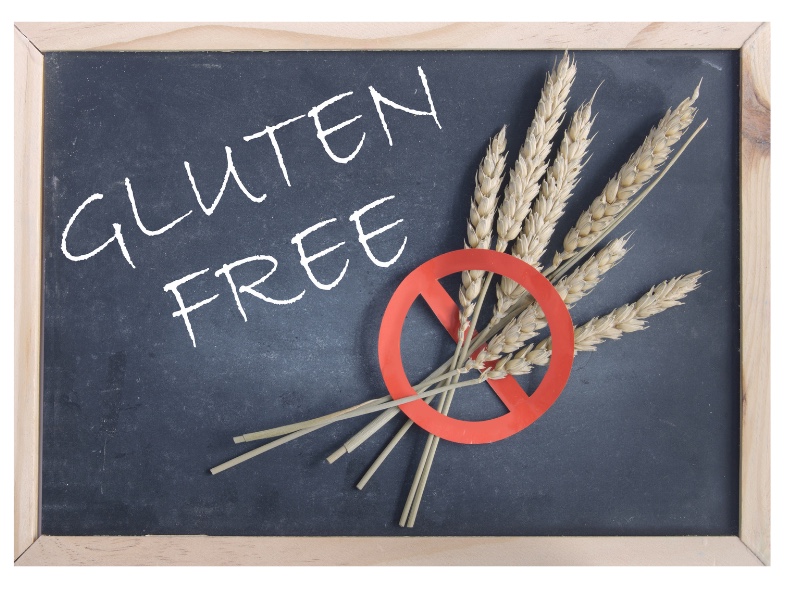
You see it all around the grocery store, on restaurant menus and hear about it on TV. But, what is gluten? And why might you consider eliminating or reducing it from your diet?
Gluten is the protein that is found in many grains such as wheat, barley, rye, spelt and some oats. There are also items, while seemingly gluten-free, that may actually contain gluten because of the way they are cooked or manufactured.
Gluten intolerance is the inability to digest or break down the protein gluten. According to Alessio Fasano, MD, director at the University of Maryland Center for Celiac Research, this condition can range from a mild sensitivity to full-blown celiac disease. Often times, people with a gluten intolerance don’t recognize the symptoms right away because they may not appear until several hours or days after the gluten was consumed.
Celiac disease is an autoimmune disorder where the ingestion of gluten leads to damage in the small intestine. This damage causes a decrease in nutrient absorption. Celiac disease affects about 1 in 100 people worldwide. It can develop at any age and can lead to serious health problems if not treated. Walter Gaman, MD, the author of Executive Medicine: Optimizing Your Chances for a Longer Life states that, “People with gluten intolerance or celiac also appear to be predisposed to developing lymphoma, which is a cancer of the lymph nodes, a risk that goes down with a diet avoiding gluten.”
Gluten intolerance and celiac disease are not the only reasons to choose a gluten-free diet. While it’s not completely understood why, research is proving that gluten-free diets can help with many autoimmune disorders like lupus, chronic fatigue syndrome, multiple sclerosis, Graves’ disease, Hashimoto’s and rheumatoid arthritis. One theory’s why eliminating gluten has been helpful has to do with the inflammatory effect gluten can have on some people.
So how do you eat gluten-free?
Eating gluten-free is much easier and much better tasting than it has ever been! Between 2012 and 2013, sales of gluten-free products in the US increased by 81%. This consumer demand has led to a variety of excellent products. Because of better labeling and more options, eating gluten-free isn’t as challenging as it used to be, but you still need to be careful. Let’s start now by going over some grains. Here are some common grains that are gluten-free:
- Rice
- Corn (Maize)
- Soy
- Potato
- Tapioca
- Beans
- Flax
- Nut flours
Here are some common grains you should completely AVOID:
- Wheat
- Rye
- Barley
- Triticale (hybrid of wheat & rye)
- Some oats
As I mentioned before, the tricky part is items that seem like they should be gluten-free but due to cross contamination or how/where they were processed, can contain gluten. The following items pose some risk and should be considered cautiously:
- Beers, Ales, Lagers
- Breading/Coating mixtures
- Brown rice syrup
- Communion wafers
- Croutons & Dressing
- Medications (prescription & OTC)
- Energy bars
- Vitamins & supplements
- Flour & cereals
- Imitation bacon & seafood
What if I eat out?
When eating away from home, another important reminder is cross-contamination. While the French fries at your favorite restaurant may not contain any gluten, if they are fried in the same oil as the gluten-filled chicken tenders, you may have a reaction. Ask if they have a dedicated gluten-free fryer or preparation area. This may not affect everyone, but someone with a true allergy or celiac disease should have this information before ordering. Keep in mind too that products and procedures are ever changing. What was gluten-free last week, may not be this week. Get good at reading labels and asking questions.
When adopting a gluten-free diet, remember this: if in doubt, go without. If you cannot verify the ingredients or the ingredient list isn’t available, it’s best to abstain. Especially, if you have celiac.
Still have questions? We’re here to help! We have products in our office that can help heal the gut and even digestive enzymes that work on gluten. If you’d like more information on these supplements or the gluten-free products we use and love, click HERE and check out the Facebook live we did on all things gluten.